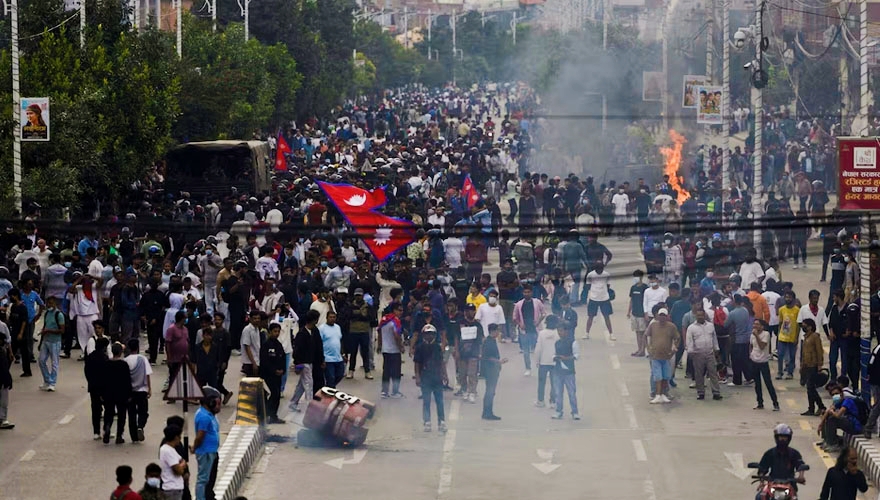The death toll from the violent protests that swept through Nepal this week has risen to at least 72 people, in one of the most violent waves of protests the country has seen since the abolition of the monarchy in 2008, according to the government's first secretary Eknarayan Aryal, announced today, Sunday.
Aryal said in an official statement:
"72 people have died, while 191 people are still receiving treatment in hospitals across the country."
These developments come at a time when the interim government has officially begun its duties, following the appointment of former Supreme Court judge Sushila Karki as Prime Minister, succeeding K P Sharma Oli, who was forced to resign under public pressure.
* Public Anger and Political Explosion
The protests that erupted last Monday began against the backdrop of social media restrictions, but quickly turned into a widespread uprising against corruption, unemployment, and the "government's failure to meet the aspirations of the people," according to activists and human rights organizations.
At the height of the protests, demonstrators flooded the streets of the capital Kathmandu, where they set fire to the parliament building, ministerial offices, and the homes of political officials, amid a state of widespread anger towards the authorities and political elites.
* Interim Prime Minister and Urgent Decisions
Sushila Karki ( 73 years old) took the oath of office on Friday, becoming the first woman to hold the position of Prime Minister in the country through an interim government, with the primary task of leading the country towards legislative elections scheduled for March 5, 2026, based on a decree from President Ram Chandra Poudel.
In her first public appearance, Karki visited several hospitals on Saturday to check on the injured, in a move considered symbolic to open a new chapter with the people.
* Cautious Relief in the Streets
Many Nepalese welcomed Karki's assumption of power, hoping for change. Durga Magar ( 23 years old), a vendor in one of the capital's markets, said:
"We don't know what will happen next, but this interim government is a good step. We just want to combat corruption and achieve justice, whether through the young generation or through seasoned officials."
Meanwhile, Suraj Bhattarai ( 51 years old), a social worker, said:
"I believe that Karki will give a strong push towards better governance."
* 20% of Nepal's Youth Unemployed
According to the World Bank, over 20% of Nepalese youth (aged 15 to 24) are unemployed, while the per capita GDP does not exceed 1450 dollars annually, reflecting the depth of the economic crisis fueling public anger.
* Security Concerns and Urgent Tasks
In light of the security breakdown, the government reported that about 12,500 prisoners escaped from jails during the chaos, posing additional challenges for the interim government.
Simultaneously, with a slight improvement in conditions, the army eased the curfew imposed on Kathmandu and several major cities, and life began to gradually return to normal, amid limited deployment of tanks and armored vehicles.
* Calls to End Impunity
Prominent human rights organizations, such as Amnesty International and Human Rights Watch, urged the new government to put an end to the culture of "impunity" that prevailed in previous governments and to ensure that violations against protesters do not recur.
* Political Background: Oli's Fall
Former Prime Minister K P Sharma Oli ( 73 years old), leader of the Nepal Communist Party, had been in office since 2024 as part of a coalition with a center-left party, having held the position four times since 2015.
However, protesters considered him a symbol of the corrupt elite, accusing him of failing to address unemployment and the cost of living, which hastened his downfall.

